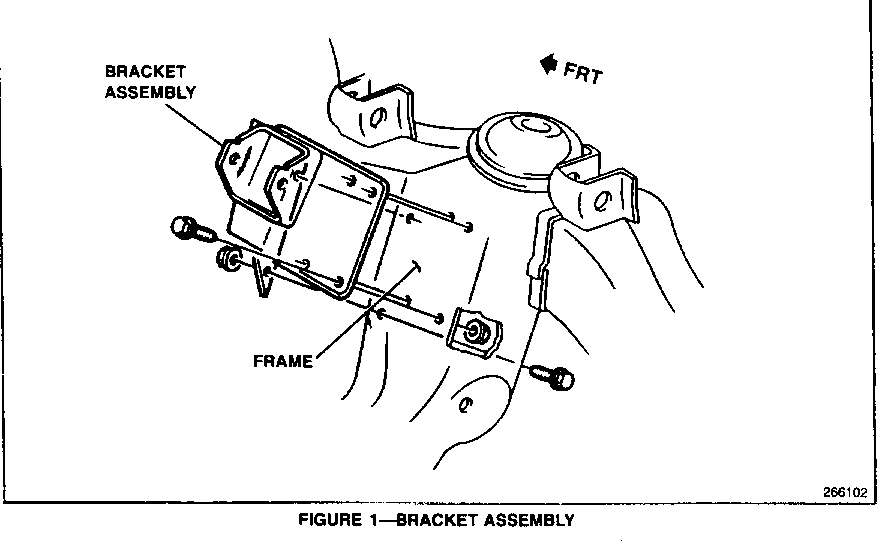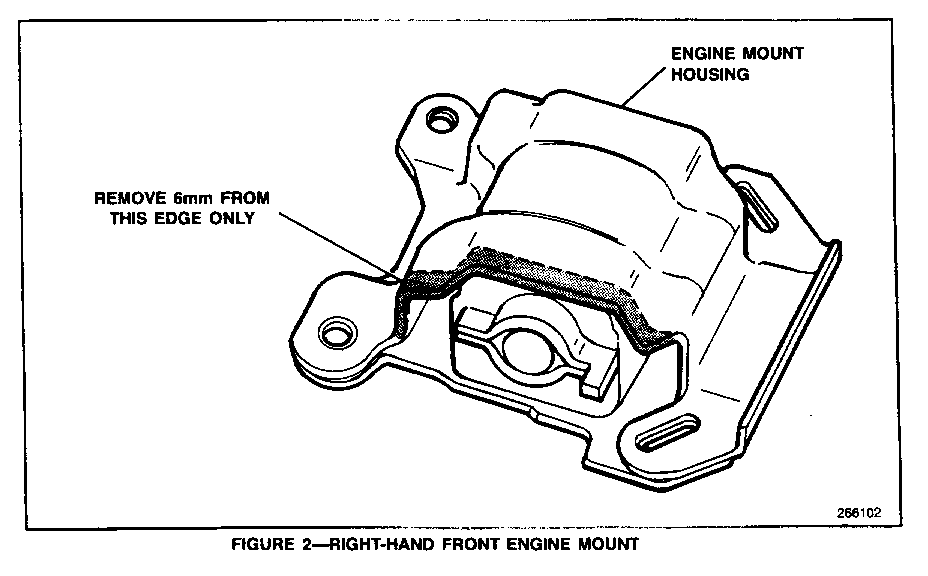VIBRATION IN SEAT AND STEERING WHEEL-MODIFY RIGHT ENGINE MNT.

Subject: VIBRATION IN SEAT AND STEERING WHEEL
Model and Year: 1988-92 C TRUCKS WITH 4.3L ENGINE
Some owners of 1988-1992 C trucks with 4.3L engines may comment about a vibration felt in the seat and steering wheel during the first few seconds of acceleration from a stop. This condition may be caused by the right front engine mount housing (Figure 2) contacting the bracket which supports the engine mount. This bracket is part of an assembly which is bolted to the frame (Figure 1).
Note: ONLY the right engine mount is affected.
Modification of the engine mount provides more clearance between the metal mount housing and the frame bracket.
SERVICE PROCEDURE:
1. Mark the area of the bracket assembly which surrounds the fight front engine mount with white detection powder (foot powder may be used).
2. Test drive the vehicle. Make 3-5 short accelerations from a stop so that the vibration occurs.
3. If witness marks occur on the bracket in front of the mount, remove the mount (steps 4-7).
If no witness marks occur, refer to the appropriate Service Manual; section 0C "VIBRATION DIAGNOSIS" for further diagnosis.
4. Remove the right side engine mounting through-bolt and nut.
5. Raise the engine only enough to permit removal of the engine mount from the engine.
6. Remove the three mounting assembly bolts.
7. Remove the right side mount assembly.
8. Remove, with a bench grinder or other suitable tool, 6mm (15/64 in.) from the front side of the lower part of the curved mount housing (Figure 2).
CAUTION:
Eye protection must be worn when using a grinder.
Important: Do not remove any more than 6mm (1 5/64 in) of metal from the mount as it may cause the mount to be too weak.
9. Install the engine mount and the three mounting assembly bolts. Torque the bolts to 51 N.m (38 lbs. ft.)
10. Lower the engine until the through-bolt can be inserted.
11. Install the engine mount through-bolt and nut and torque to 95 N.m (70 lbs. ft.).
Important: Do not perform the service fix to 1993 trucks. Removing 6mm (15/64 in.) from the mount of one of these vehicles, will decrease the strength of the mount to an unacceptable level.
Installing a new mount will not repair the vehicle.
Warranty Information
For vehicles repaired under warranty use:
Labor 0p Description Labor Time -------- ----------- ---------- T7481 Diagnosis (Steps 1-3) 0.4 hrs. T7486 Modification of Mount 0.8 hrs. (Steps 4 - 1 1)
Note: Labor Operation is coded to base vehicle coverage in the Warranty System.


General Motors bulletins are intended for use by professional technicians, not a "do-it-yourselfer". They are written to inform those technicians of conditions that may occur on some vehicles, or to provide information that could assist in the proper service of a vehicle. Properly trained technicians have the equipment, tools, safety instructions and know-how to do a job properly and safely. If a condition is described, do not assume that the bulletin applies to your vehicle, or that your vehicle will have that condition. See a General Motors dealer servicing your brand of General Motors vehicle for information on whether your vehicle may benefit from the information.
